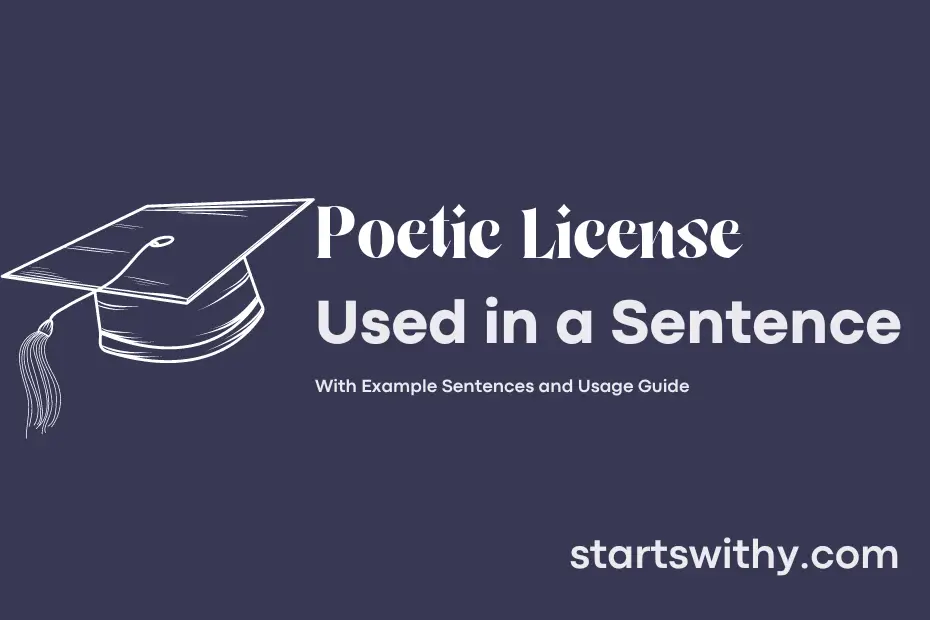Have you ever heard of the term “poetic license”? Essentially, poetic license is a literary device that allows writers to take creative liberties with language, structure, or content in order to enhance the artistic or aesthetic quality of their work.
This freedom gives writers the ability to deviate from standard rules of grammar, vocabulary, or even reality to create a truly unique and powerful piece of writing. Poetic license empowers authors to experiment with different forms and styles, ultimately leading to more expressive and imaginative storytelling.
7 Examples Of Poetic License Used In a Sentence For Kids
- The moon smiled and winked at the twinkling stars.
- The sun painted the sky with hues of orange and pink.
- The flowers whispered secrets to the gentle breeze.
- The rain danced on the leaves with a soft pitter-patter.
- The butterflies wore dresses made of vibrant colors.
- The clouds played hide and seek with the shy sun.
- The birds serenaded the world with melodies of joy.
14 Sentences with Poetic License Examples
- Poetic license allows the writer to bend the rules of grammar and syntax for creative expression.
- Aspiring poets often use poetic license to convey their deepest emotions through their writing.
- English literature students are encouraged to understand and appreciate the use of poetic license in various literary works.
- The professor awarded extra points to the student who demonstrated a strong grasp of using poetic license effectively in their poetry analysis.
- Creative writing workshops are the perfect place for students to experiment with different forms of poetic license in their work.
- Indian poets have a rich tradition of using poetic license to infuse their verses with cultural nuances and personal insights.
- Poetry readings at college events showcase the diverse ways in which students employ poetic license in their compositions.
- The poet’s clever use of poetic license in creating poignant metaphors left the audience in awe at the poetry recital.
- Students studying poetry appreciate the power of poetic license in transforming ordinary words into lyrical masterpieces.
- The literary magazine published a thought-provoking article on the history and evolution of poetic license in contemporary poetry.
- Understanding the boundaries of poetic license can help students avoid unintentional errors in their creative writing assignments.
- By granting themselves poetic license, students can break free from conventional writing rules to unleash their creativity.
- College professors often commend students who demonstrate a mastery of using poetic license to enhance their prose and poetry assignments.
- Attending writing workshops can help students refine their skills in utilizing poetic license effectively in their creative works.
How To Use Poetic License in Sentences?
Poetic License is a term used to describe the freedom that poets have to break typical rules of language and grammar in order to create a desired effect in their writing. When used effectively, Poetic License can add depth, emotion, and creativity to a poem.
To use Poetic License in a sentence, first identify the specific rule you want to break. This could be anything from word order and sentence structure to spelling and punctuation. Next, consider the effect you want to achieve by breaking this rule. Do you want to create a sense of rhythm, emphasize a certain word or phrase, or evoke a particular mood?
For example, consider the sentence: “The sun brightly shined down upon the green trees.” By using Poetic License to switch the expected order of “brightly shined” to “shined brightly”, the writer is able to create a more vivid image of the sun‘s radiant glow. This alteration not only adds an element of creativity to the sentence but also enhances the overall poetic quality.
Remember that Poetic License should be used purposefully and with intention. Experiment with different ways of breaking rules to see what effect it has on your writing. With practice, you can harness the power of Poetic License to enrich your poetry and engage your readers.
Conclusion
In writing, poetic license allows authors to deviate from standard rules of grammar and syntax for the sake of artistic expression. By employing creative liberties such as unusual word choices, unconventional sentence structures, and imaginative imagery, writers can evoke strong emotions, provoke thought, and convey complex ideas in a distinctive and compelling manner. Poetic license adds a layer of depth and richness to literary works, enabling writers to craft unique and memorable sentences that resonate with readers on a deeper level.
While poetic license can enhance the beauty and impact of language, it is essential for writers to use it judiciously and purposefully to avoid confusing or alienating their audience. By striking a balance between artistry and clarity, writers can harness the power of poetic license to captivate readers and imbue their words with beauty, meaning, and resonance.



